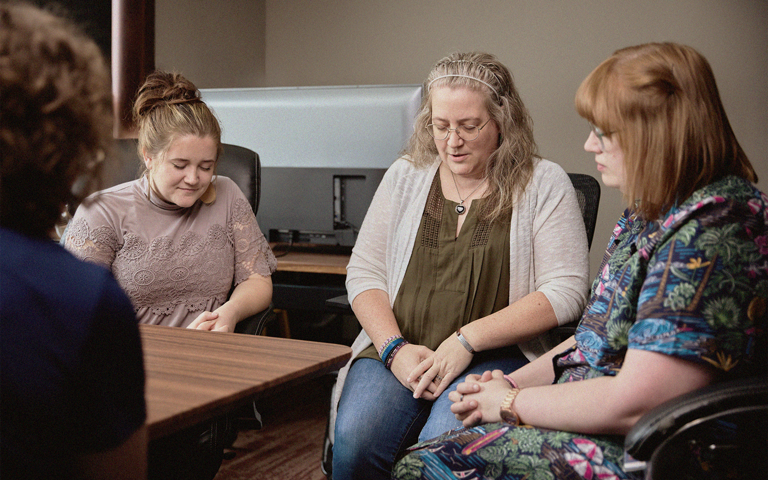Cancer is a leading cause of death worldwide, and certain types of cancer disproportionately affect women. Here are the top six most common cancers for women, along with the screening tests that have the best evidence for early detection. Early detection of these cancers can lead to improved outcomes.
If you have a cancer diagnosis, know that your CHM family is there for you both spiritually and physically. Learn how cancer medical bills are shared—and how we pray for and support members facing this diagnosis.
Breast Cancer
Breast cancer is the most common cancer among American women, excluding skin cancers. According to the American Cancer Society, it accounts for about 30% of all new cancer diagnoses each year. Most cases are diagnosed in women 55 and older, though it can occur in younger women as well.
The most effective screening tool is mammography, which is recommended every two years in all women 40 to 74. Women with a personal or family history of breast, ovarian, tubal, or peritoneal cancer or who have a family history associated with breast cancer susceptibility should be administered a familial risk assessment by their primary care clinician. In some higher risk cases, breast MRI (in conjunction with mammography) is also recommended.
Lung Cancer
Lung cancer is the second most common cancer and the leading cause of cancer death. It accounts for about 13% of new cancer cases in women each year. It primarily affects older adults, with most diagnoses occurring in women 65 and older.
Low-Dose Computed Tomography (LDCT) is recommended annually for women aged 50 to 80 who currently smoke or have quit smoking within the past 15 years. LDCT has been shown to reduce lung cancer mortality by detecting the disease at an earlier, more treatable stage.
Colorectal Cancer
Colorectal cancer is the third most common cancer. Cancers of the colon and rectum accounts for about 7% of all new cancer cases each year. The risk of colorectal cancer increases with age, with most cases diagnosed in individuals 50 and older.
Colonoscopy is recommended every 10 years starting at age 45 for average-risk women. This procedure allows for the detection and removal of precancerous polyps. An alternative to colonoscopy is the Fecal Immunochemical Test (FIT): an annual stool test that detects hidden blood, which is an early sign of cancer. Finally, flexible sigmoidoscopy is another option, and recommended every five years when combined with FIT.
I recommend colonoscopy. While it’s inconvenient and can be uncomfortable, it views the entire colon and dramatically cuts one’s risk of colon cancer by catching polyps before they transition into cancer.
Uterine (Endometrial) Cancer
Uterine cancer, primarily endometrial cancer, is the fourth most common cancer, totaling 7% of new cancer cases in women each year. Its risk increases with age, with most cases diagnosed in women 55 and older.
Unlike other cancers, there are no standard uterine cancer screening tests for women at average risk. However, it’s critically important that women report any abnormal vaginal bleeding or discharge to their healthcare provider, especially postmenopausal bleeding, as this can be an early symptom.
Endometrial biopsy is recommended for women with symptoms or for those at high risk due to factors such as Lynch syndrome (hereditary nonpolyposis colorectal cancer [HNPCC], an inherited genetic disorder that significantly increases the risk of developing several types of cancer, particularly colorectal and endometrial cancer).
Thyroid Cancer
Thyroid cancer accounts for about 5% of all new cancer cases each year. While thyroid cancer can occur at any age, it’s most diagnosed in women 20 to 55.
There are no standard screening tests for thyroid cancer for women at average risk. Instead, a neck examination by your primary care physician during routine check-ups helps detect abnormalities. Ultrasound and/or radioactive iodine scans are often used to evaluate thyroid nodules detected during a physical exam.
Cervical Cancer
Cervical cancer is an important consideration, especially in young women. It’s most often associated with human papillomavirus (HPV), which can injure vulnerable cells in the cervix. Women especially between the ages of 21 and 29 should be screened at least every three years by Papanicolaou (Pap) smears, and every five years until age 65.
Conclusion
Regular screening and awareness of symptoms are crucial in managing these cancers and improving survival rates. Women should discuss their individual risk factors and screening options with their physician to make informed decisions about what cancer monitoring is most appropriate for them.
References
- CDC Cancer and Women – https://www.cdc.gov/cancer/features/cancer-and-women.html
- National Cancer Institute: Screening Tests – https://www.cancer.gov/about-cancer/screening/screening-tests
- USPSTF A and B Recommendations https://www.uspreventiveservicestaskforce.org/uspstf/recommendation-topics/uspstf-a-and-b-recommendations







